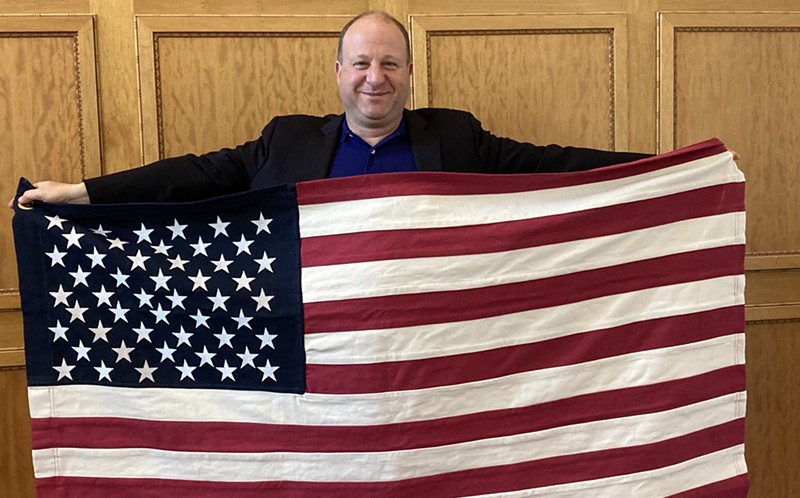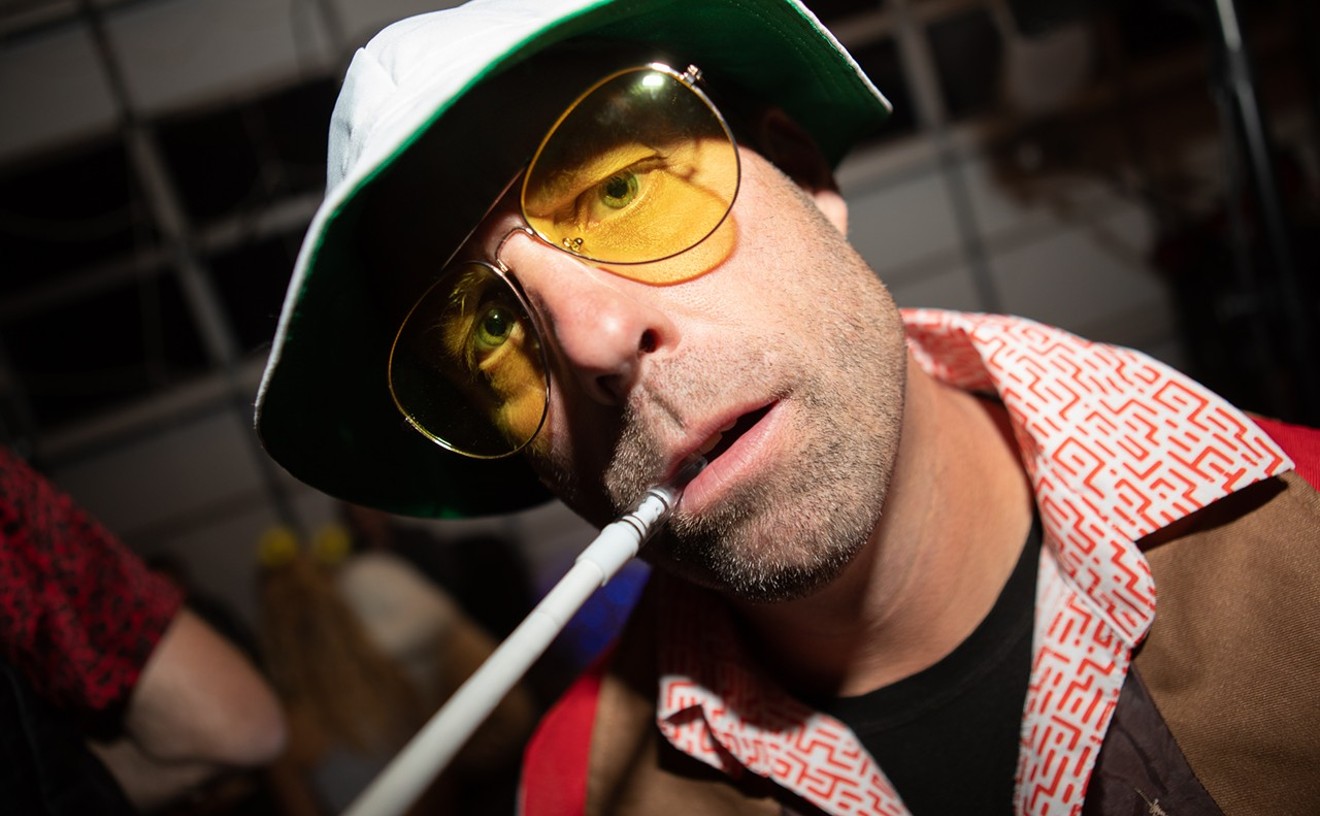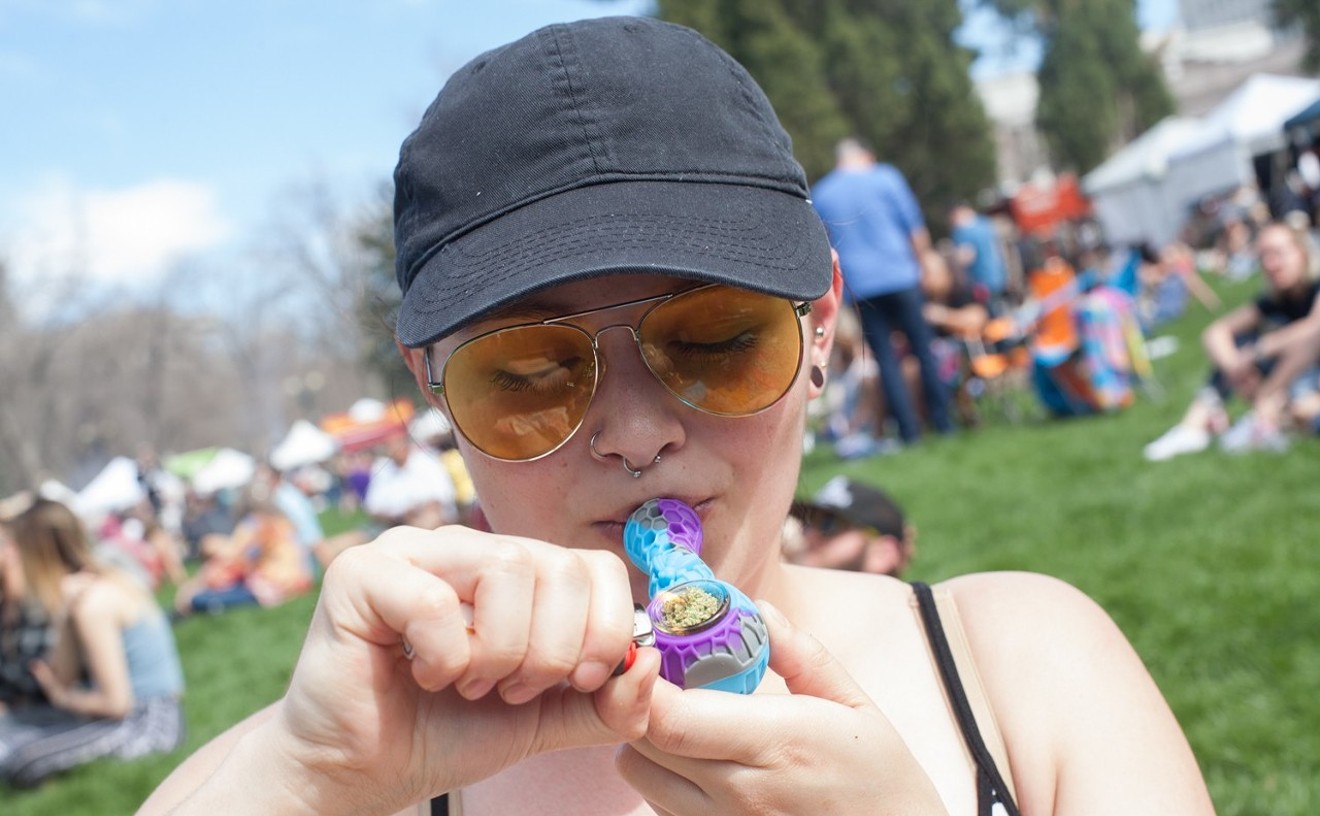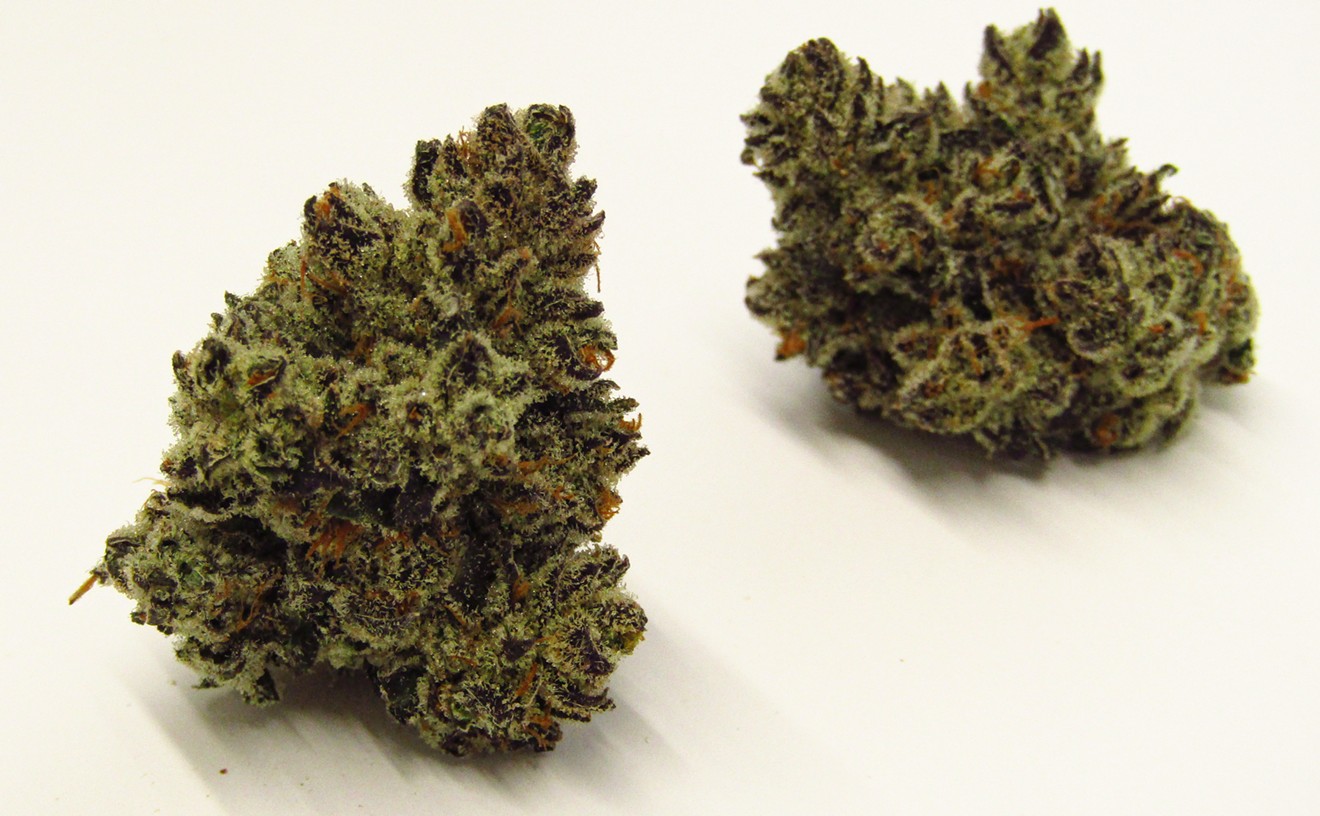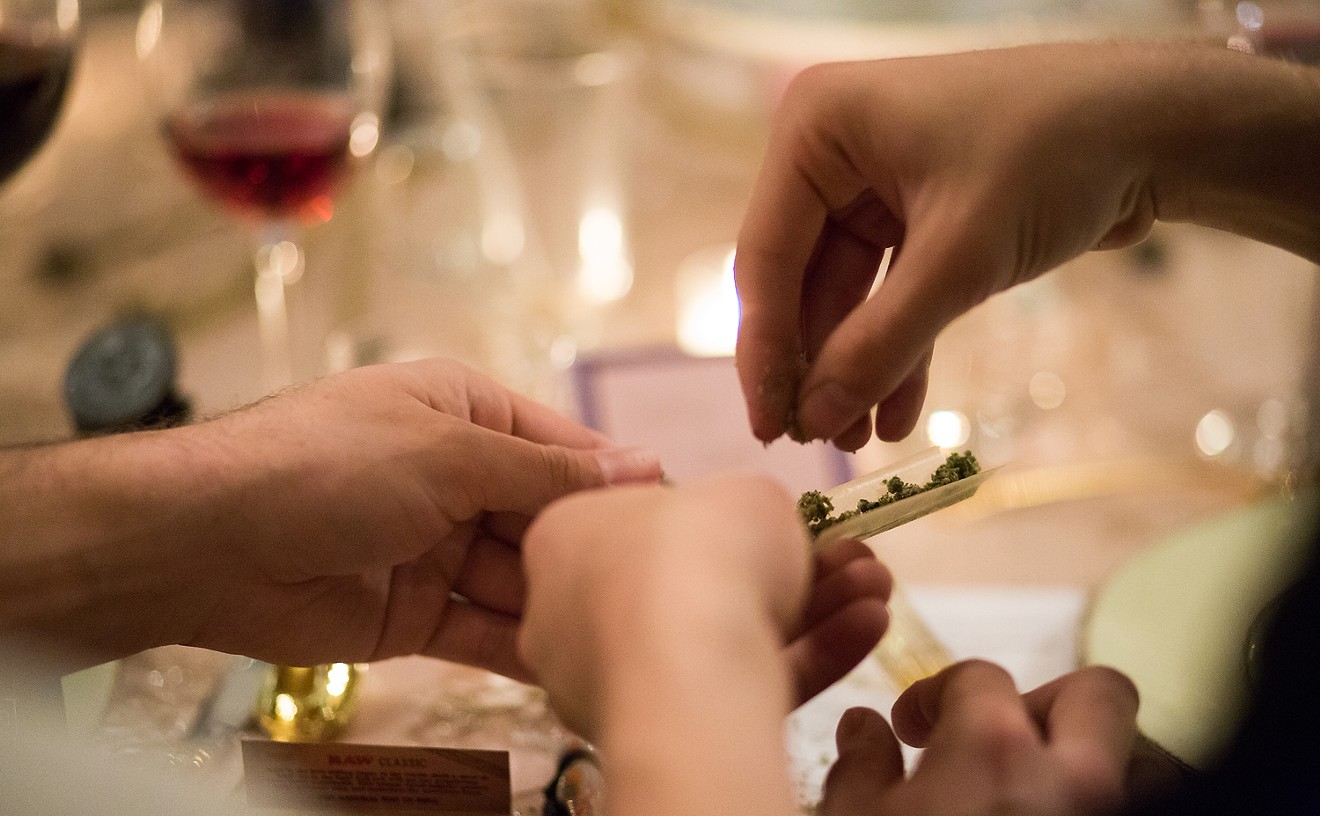Colorado's going steady with hemp, as Governor Jared Polis has declared June 6 through 13 Hemp Week in Colorado for the second straight year.
A United States flag made of hemp was raised at the Colorado Capitol to cap off Colorado Hemp Week last year, and the Colorado Hemp Association (COHA) planned to continue the tradition in 2021 — but not without a couple of changes.
The Kentucky Cloth Project did a fine job of making the U.S. hemp flag that flew in 2020, but COHA wanted to localize the effort this year. It hired Margaret Eversole of Mesa County to sew both a U.S. flag and a State of Colorado flag made of hemp; they're now flying at the Capitol through June 13.
“It’s great that we can recognize our farmers and all the benefits this crop has provided to Colorado. Flying the hemp flag over the Capitol has become a tradition that says, ‘We’re here as an industry and we’re sticking around!’” COHA president Bethleen McCall says in a statement.
Polis has an affinity for hemp flags dating back to his days in the U.S. House of Representatives. On July 4, 2013, the then-congressman used his pull on Capitol Hill to fly Colorado native Michael Bowman's hemp flag over the U.S. Capitol Building in Washington, D.C., despite the flag's source material being federally illegal at the time.
Since becoming governor in 2018, Polis has made several pledges to the state's hemp industry, including launching the Colorado Hemp Advancement & Management Plan (CHAMP) Initiative after the Farm Bill federally legalized industrial hemp farming in late 2018. The program, run through the state Department of Agriculture, seeks to implement new laboratory testing rules, easier access to financial resources, and further research into more reliable hemp seeds and genetics.
Polis also pushed for easier hemp-farmer registration and tax benefits for hemp companies looking to headquarter in Colorado, leading the state to one of the highest percentages of allotted acreages for hemp farming in the country. While an oversupply of hemp in 2019, the emergence of Delta-8 THC and a controversial start to the construction of a state Hemp Center of Excellence research center have tested Polis's relationship with industry leaders, they weren't enough to stop Hemp Week or Polis's appearance at the NoCo Hemp Expo in March, when he touted the hemp industry as a tool toward economic recovery post-COVID.
"If anyone is ready to plant the seeds for rapid recovery and growth for future generations, it is the hemp community, and, more specifically, the Colorado hemp community," Polis told a room of hemp-industry members at the NoCo expo.
Colorado could use the good juju. Earlier this month, the CDA sent a revised draft of proposed state hemp regulations to the United States Department of Agriculture, which now oversees hemp production at the federal level and must approve a state's hemp framework going forward. Colorado's first draft, proposing looser testing and post-harvesting rules than those of the USDA, was denied in 2020.
"Hemp producers play an important role in Colorado’s economy, and it's important that as a state, Colorado does all it can to help create jobs and benefit consumers,” Polis said at the time.
The COHA expects Colorado Hemp Week to continue next year, with plans to add a third flag at the Capitol: a hemp-sewn rainbow flag celebrating Pride Month.
[
{
"name": "Air - MediumRectangle - Inline Content - Mobile Display Size",
"component": "12017618",
"insertPoint": "2",
"requiredCountToDisplay": "2",
"watchElement": ".fdn-content-body",
"astAdList": [
{
"adType": "rectangle",
"displayTargets": "mobile"
}
]
},{
"name": "Editor Picks",
"component": "17242653",
"insertPoint": "4",
"requiredCountToDisplay": "1",
"watchElement": ".fdn-content-body",
"astAdList": [
{
"adType": "rectangle",
"displayTargets": "desktop|tablet"
},{
"adType": "rectangle",
"displayTargets": "desktop|tablet|mobile"
}
]
},{
"name": "Inline Links",
"component": "18838239",
"insertPoint": "8th",
"startingPoint": 8,
"requiredCountToDisplay": "7",
"maxInsertions": 25
},{
"name": "Air - MediumRectangle - Combo - Inline Content",
"component": "17261320",
"insertPoint": "8th",
"startingPoint": 8,
"requiredCountToDisplay": "7",
"maxInsertions": 25,
"watchElement": ".fdn-content-body",
"astAdList": [
{
"adType": "rectangle",
"displayTargets": "desktop|tablet"
},{
"adType": "rectangle",
"displayTargets": "desktop|tablet|mobile"
}
]
},{
"name": "Inline Links",
"component": "18838239",
"insertPoint": "8th",
"startingPoint": 12,
"requiredCountToDisplay": "11",
"maxInsertions": 25
},{
"name": "Air - Leaderboard Tower - Combo - Inline Content",
"component": "17261321",
"insertPoint": "8th",
"startingPoint": 12,
"requiredCountToDisplay": "11",
"maxInsertions": 25,
"watchElement": ".fdn-content-body",
"astAdList": [
{
"adType": "leaderboardInlineContent",
"displayTargets": "desktop|tablet"
},{
"adType": "tower",
"displayTargets": "mobile"
}
]
}
]

